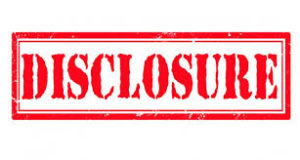Creating a Real Incentive for Self-Reporting FCPA Violations (Part II of II)
 Let’s start with a big “If.” I know that sounds like a real turn off but bear with me.
Let’s start with a big “If.” I know that sounds like a real turn off but bear with me.
Assuming that the Justice Department is ready to turn over a new approach to criminal enforcement and aggressively prosecute culpable individuals in white collar crime investigations, would it be a good idea to offer a pass, or leniency to the company if the company self-reports the violation, cooperates and implements timely remediation. It is tempting to consider this approach, and one wonders why the Justice Department did not go that far in its FCPA Pilot Program. A true pilot program should be an experiment of an idea – and this one sounds like a good idea to try.
A new approach may be needed. It is hard to say that companies that suffer large fines that are passed on to shareholders (and possibly consumers) creates an adequate deterrence to corporate misconduct.
An individual actor may think twice, however, if the actor considers the risk of individual prosecution. White collar criminals cannot handle one day in jail, let alone any negative impact to their reputation or standing in the community. White collar criminals have a real hard time acknowledging they committed a crime.
Rather than tinkering at the edges of percentage fine reductions for companies, be it a 25 percent or a 50 percent reduction from the fine range, what would happen if a company that self-reported, cooperated and implemented timely remediation was given a pass? Also, would it be appropriate to implement this policy for a 2-3 year trial period and create enough of a track record to measure the results.
A company that does not self-report, cooperate or implement timely remediation would have to pay some fine or penalty, and of course, companies would have to disgorge ill-gotten profits. I think the experiment would be worth a trial run.
The argument against such a proposal is fairly straightforward – there should be some punishment of a company beyond the individuals involved. Also, if for example, Siemens had self-reported, cooperated and implemented timely remediation, and several individuals were prosecuted for criminal FCPA offenses, would it be fair for Siemens not to pay any fine except for disgorgement?
Right now, CEOs and senior management do not consider themselves at risk for criminal prosecution of an FCPA case, even in those cases where they may have had reason to know, an inkling, that bribery was occurring and they did nothing about it.
The dynamic around prosecuting individuals can lead to real significant results – once the hammer of criminal prosecution starts to be used, you may find more individuals choosing to plead guilty and cooperate against higher-ups who may have been involved or sanctioned criminal conduct. The impact of a far-reaching prosecution against numerous individuals on conspiracy and substantive grounds would send a real message.
 Unfortunately, the message being sent today is companies will have to pay big fines, companies will have huge legal bills and require significant compliance remediation. No senior executives are going to jail, and even in cases where they have been involved (e.g. Avon, VimpelCom), no one is even being charged.
Unfortunately, the message being sent today is companies will have to pay big fines, companies will have huge legal bills and require significant compliance remediation. No senior executives are going to jail, and even in cases where they have been involved (e.g. Avon, VimpelCom), no one is even being charged.
Given the current system, as it is working in practice, a Pilot Project with a focus on individual prosecutions could be an appropriate alternative that may be worth a try.














